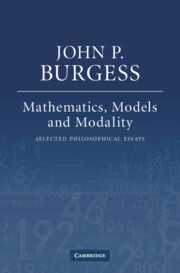Book contents
- Front matter
- Contents
- Preface
- Source notes
- Introduction
- PART I MATHEMATICS
- PART II MODELS, MODALITY, AND MORE
- 8 Tarski's tort
- 9 Which modal logic is the right one?
- 10 Can truth out?
- 11 Quinus ab omni naevo vindicatus
- 12 Translating names
- 13 Relevance: a fallacy?
- 14 Dummett's case for intuitionism
- Annotated bibliography
- References
- Index
14 - Dummett's case for intuitionism
Published online by Cambridge University Press: 22 September 2009
- Front matter
- Contents
- Preface
- Source notes
- Introduction
- PART I MATHEMATICS
- PART II MODELS, MODALITY, AND MORE
- 8 Tarski's tort
- 9 Which modal logic is the right one?
- 10 Can truth out?
- 11 Quinus ab omni naevo vindicatus
- 12 Translating names
- 13 Relevance: a fallacy?
- 14 Dummett's case for intuitionism
- Annotated bibliography
- References
- Index
Summary
TEXTS
Some philosophers approach mathematics saying, “Here is a great and established branch of knowledge, encompassing even now a wonderfully large domain, and promising an unlimited extension in the future. How is mathematics, pure and applied, possible? From its answer to this question the worth of a philosophy may be judged.”
Other philosophers approach mathematics in a quite different spirit. They say, “Here is a body, already large and still being extended, of what purports to be knowledge. Is it knowledge, or is it delusion? Only philosophy and theology, from their standpoint prior and superior to that of mathematics and science, are worthy to judge.” While this inquisitorial conception of the relation between philosophy and science is less widely held today that it was in Cardinal Bellarmine's time, it continues to have many distinguished advocates.
Prominent among these is Michael Dummett, who has repeatedly advanced arguments for the claim that much of current mathematical theory is delusory and much of current mathematical practice is in need of revision – arguments for the repudiation, within mathematical reasoning, of the canons of classical logic in favor of those of intuitionistic logic. While nearly everything Dummett has written is pertinent in one way or another to his case for intuitionism, there are two texts especially devoted to stating that case: his much anthologized article (Dummett 1973a) on the philosophical basis of intuitionistic logic; and the concluding philosophical chapter of his guidebooks (Dummett 1977) to the elements of intuitionism.
Information
- Type
- Chapter
- Information
- Mathematics, Models, and ModalitySelected Philosophical Essays, pp. 256 - 276Publisher: Cambridge University PressPrint publication year: 2008
